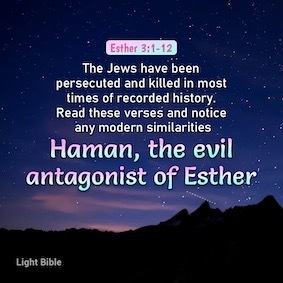Devotion
Hamamatsu, the evil antagonist of Esther
David Jacobs
You might think that anti-Semitism is a modern development. "Perhaps it came about right before World War 2. Perhaps it came about as a result of Christ's crucifixion." While these thoughts are logical, the Jews have attracted enemies that wished to destroy them since their existence.
The primary antagonist of Esther is named Haman. Haman is appointed by the king to a position above all the other princes (Esther 3:1). As the king's "right-hand man," all the servants should show their respect and bow to Haman when he approached. One man named Mordecai, refused to bow. Haman discovered that Mordecai was a Jew, and began plotting a way "to destroy all the Jews that were throughout the whole kingdom of Ahasuerus" (Esther 3:6). Scholars debate the reason why Mordecai did not bow to Haman, which was certainly a risky maneuver, but let us not ignore what happens next: Haman approached the king with a plan for genocide. A plan to eliminate all Jews, because they did not keep the same laws as the king. Haman offered to pay the king ten thousand talents of silver, to which the king replies to Haman to keep his money and do with the Jews as he pleases. It is truly terrifying.
There are certainly differences between people: different sizes, religions, cultures, language, and laws.
Prayer
Are we not all equals in the sight of God? Are we not to be judged the same way by the one true Lord? Whether a person be Christian, Muslim, Buddhist, atheist, Hindu, or Jewish, as Christians we have been given a new commandment by Christ himself: love each other as he has loved us. Go from this place to serve the Lord, the people, to love the Lord, and love the people. Leave the rest of it to God.
















